SUMMARY
This is AI generated summarization, which may have errors. For context, always refer to the full article.
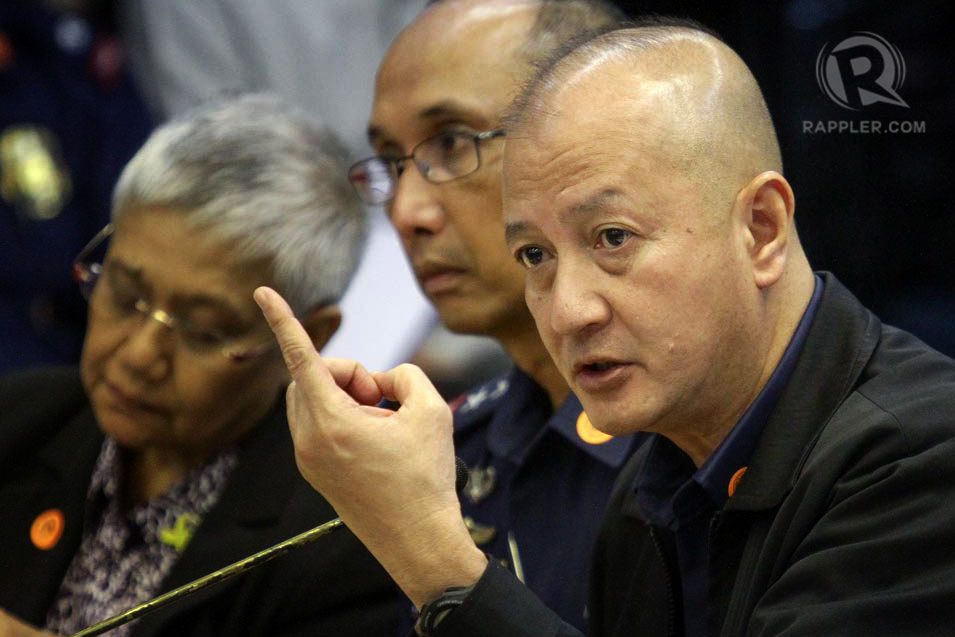
MANILA, Philippines – What ifs and what could have beens took centerstage at the Senate on Tuesday, February 10, during the second hearing on a bloody police operation that neutralized a Jemaah Islamiyah terrorist. That operation came with a high price: the death of at least 68, including 44 elite police commandos.
Before the Senate session on Tuesday, senators, government officials and officers from the military and police forces had debated over what has been a touchy topic for both the Philippine National Police (PNP) and the Armed Forces of the Philippines (AFP): the lack of coordination in the lead up to the police operation. This, in turn, made it difficult for the military to swoop in and help beleaguered cops.
On Monday, during the Senate’s first hearing on the operation, senators focused on supposed lapses in the PNP’s chain of command during the operation.
PNP officer-in-charge Deputy Director General Leonardo Espina was kept out of the loop prior to the operation, under the “advice” of former PNP chief Director General Alan Purisima.
Purisima, then serving a suspension order from the Ombudsman, was apparently a “focal” person in the operation.
Prior to his suspension, he facilitated the intelligence packet that formed the basis of “Oplan Exodus.” Even during his suspension, he sat in briefings with no less than President Benigno Aquino III himself.
The Senate, along with other government and non-government bodies, are in the middle of independent probes into the incident, one of the bloodiest encounters in the PNP’s history. (READ: Police, military generals face off over Mamasapano)
Where were the reinforcements?
Emotions ran high as senators prodded officials of the PNP and the AFP, repeatedly asking the AFP why it took so long for them to send reinforcements.
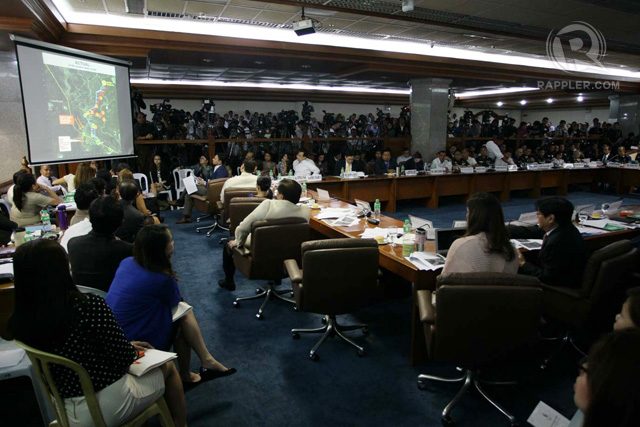
DAY ONE: Senate probes ‘Oplan Exodus’
- AS IT HAPPENS: Senate hearing on PNP-SAF Mamasapano clash, day 1
- Espina to MILF: Why the ‘overkill’ of my men?
- Poe warns Napeñas of insubordination, misconduct
- Aquino, Purisima were at final ‘Oplan Exodus’ briefing
- Senators question MILF absence in SAF hearing
- Command or advice? Senators say Purisima story ‘incredible’
- Police, military generals face off over Mamasapano
- Why SAF didn’t trust military
- Sacked SAF commander: What drones?
All but one policeman from the PNP Special Action Force (SAF) 55th Special Action Company and 9 from the US-trained 84th Seaborne Company died during the encounter. Scores of fighters from the MILF and several civilians were also casualties.
Senator Alan Peter Cayetano asked if the AFP “sacrificed” the 44 SAF troopers to “save” the peace process.
AFP Chief of Staff General Gregorio Catapang refuted Cayetano’s assertions, insisting that it was simply too difficult for military forces to jump in and help SAF troopers.
The morning of January 25, when the SAF called for help, the military was unsure of the situation on the ground.
Mamasapano Mayor Benzar Ampatuan said even the local government – barangay officials included – did not know what was going on immediately.
“We tried to make the fighting, the encounter stop. But civilians, even local officials were unable to go inside the area because of the fire fight,” he told senators.
Catapang said it was not immediately clear to the AFP if the SAF was merely informing them about the firefight against MILF and BIFF fighters, or if they were already asking for help.
“We were just informed [by the PNP] at 5:30 am but there was no request for reinforcement. We were just informed they were conducting operations,” said Catapang, referring to a text message sent by Purisima.
Cayetano, who withdrew his co-authorship of the proposed Bangsamoro Basic Law following the encounter, asked if the AFP had helicopters on standby in the area. The general said they didn’t and added that the SAF did not request for one.
“Kung nalulunod ako, sasabihin ko pa sa iyo anong klaseng salbabida?” retorted the senator. (If I’m drowning, do I have to specify what kind of help I need?)
Coordination
Interior Secretary Manuel Roxas II, whom Senator Grace Poe described as among the “calmer” voices in the discussion, turned emotional too when the senator asked who he thought should be liable for the bloodshed.
“With due respect to the Armed Forces… Tama, walang coordination. Walang prior coordination, sinasabi time on target. Pero tanong ko naman po, at magalang kong tinatanong ito: Wala ngang coordination pero saklolo lang ang tinawag nito eh. SOS na ito eh,” said the Interior chief, who is also chairman of the National Police Commission.
(They’re right. There was no coordination, no prior coordination because it was time on target. But my question is, and I am asking respectfully: Sure, there was no coordination but they were asking for help. It was an SOS.)
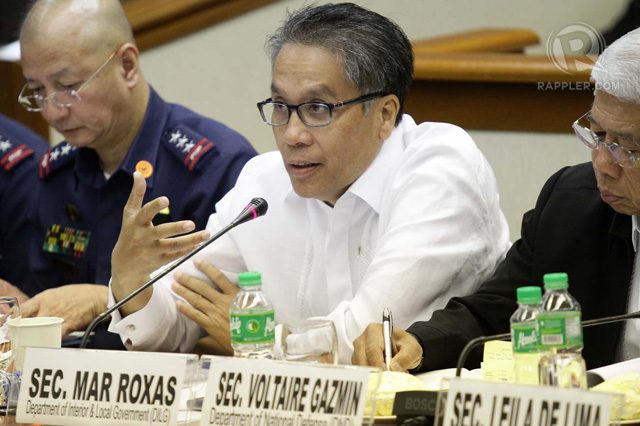
Roxas was similarly kept out of the loop prior to the operation, and found out only after his office was contacted by a mayor from a neighboring town. It was pointed out though that Roxas as DILG chief is not part of the PNP’s chain of command.
The Army was only able to fire white phosphorous in the area at 6:30 pm, more than 12 hours after the first bullets were fired. Military officials, even during the Monday hearing, explained to senators that even the act of firing white phosphorous was no easy task – misfiring could have resulted in the injury of government forces and even civilians.
Senator Antonio Trillanes IV, a former Navy officer, came to the AFP’s defense. “It’s not as if the AFP sat on the information,” said the senator, a graduate of the Philippine Military Academy.
Trillanes also defended the Army’s 6th Infantry Division chief Major General Edmundo Pangilinan for his decision to “stick to protocol.”
“They’re saying the 6th ID dilly-dallied in sending artillery fire. If you had released artillery fire and hit SAF troopers [by accident], that would be the subject of our inquiry. Artillery is not an exact science,” he added.
PNP SAF commander Police Director Getulio Napeñas and the rest of the SAF command decided they would only inform the military, the MILF and other officials of the operation “time on target,” or only after troops had entered the area.
To one senior police official, the blame should not be placed on the AFP as an institution.
“[Napeñas took the risk. He took it knowing too well that if you don’t coordinate, you can’t get the quick response of the AFP,” he said.
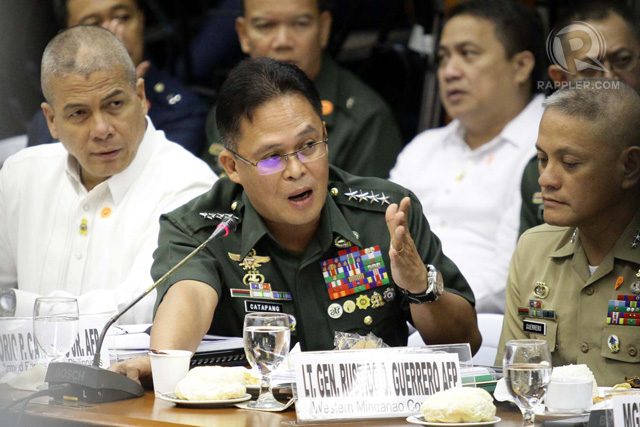
During the hearing, Napeñas explained he relied on Purisima to communicate with the AFP. After a briefing with the President at Bahay Pangarap, Purisima told Napeñas that he would be in charge of informing Catapang, his classmate from the PMA.
Espina, in an attempt to deflate and downplay what’s being perceived to be a rift between the military and police, said the two institutions’ relationship remains “very vibrant and very close.”
“Baka lang hindi nagkaintindihan, some elements on the ground between AFP and PNP. Kung puwede sana, baka puwedeng sinasabing AFP-PNP differences ay ma-refer lang doon,” Espina later told reporters after the hearing.
(Maybe some elements of the AFP and PNP on the ground had misunderstandings. If it’s possible, let’s limit the discussion of AFP and PNP differences to them.)
A new casualty?
But to at least one senator, neither the PNP or the AFP was to blame for the bloodshed in Mamasapano. “Ang ultimate na may kasalanan dito ay ang MILF,” said Cayetano. (Ultimately, the MILF is at fault here.)
The bloodshed in Mamasapano town, Maguindanao has also relaunched heated debates over a peace deal between the government and Moro Islamic Liberation Front (MILF). Both MILF and Bangsamoro Islamic Freedom Fighters (BIFF) forces surrounded and overwhelmed elite SAF troopers during the encounter in Mamasapano.
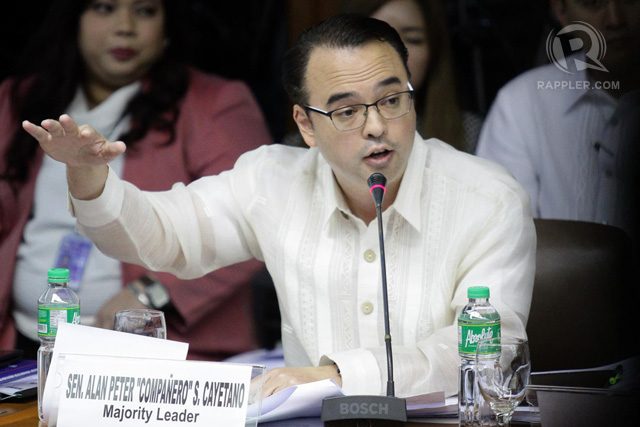
Cayetano during the hearing criticized the MILF for “coddling” Marwan. “We are in trouble because our peace negotiators don’t even know we cannot negotiate with terrorists,” said the senator. (READ: Did MILF coddle Marwan? Police, military chiefs differ)
His presentation drew an impassioned reaction from Presidential Adviser on the Peace Process Teresita Quintos Deles who took exception to the senator’s statements.
“There is a history. Every armed group in the world that fought long and hard had flirtations with terrorist groups, but since 2003, there was no evidence of institutional links between MILF and terrorism,” she said.
The lone MILF representative during the hearing, the MILF’s chair in the Coordinating Committee on the Cessation of Hostilities Rashid Ladiasan, denied Cayetano’s allegations. (READ: MILF skips Senate hearing on Mamasapano anew)
“We will not sacrifice 17 years. It’s been more than 17 years since we started the peace talks. When I was born under martial law, I already experienced this conflict. I do not want to lose this opportunity,” he said, his voice cracking. (READ: MILF: We will return SAF arms, personal items)
At the House of Representatives, hearings on the proposed law have been put on hold pending a probe into the incident. Aside from Cayetano, Senator Juanito Joseph Victor Ejercito has also since withdrawn his support of the bill.
Another hearing is scheduled on Thursday, February 12, at the Senate. The House of Representatives, meanwhile, is set to begin its own probe on Wednesday, February 11.
The PNP’s Board of Inquiry will release the results of their internal investigation by the end of February. – Rappler.com
Add a comment
How does this make you feel?
 TIMELINE: Mamasapano clash
TIMELINE: Mamasapano clash
There are no comments yet. Add your comment to start the conversation.